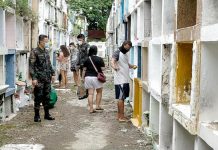
INDEED, Congress is now almost insurgency-free. What once seemed to be shaping into another “white area” — a zone vulnerable to urban infiltration — has now been largely cleared following the results of the recent midterm elections.
Well, almost. A majority of leftist or CPP-NPA-NDF-affiliated or identified party-list groups failed to win seats in the upcoming Congress. However, the Alliance of Concerned Teachers (ACT) and Kabataan Party-list still managed to secure one seat each.
Bayan Muna has been perpetually disqualified after losing in three consecutive elections, and Gabriela failed to win a seat this time around. Likewise, none of the 11 senatorial candidates endorsed by the Makabayan bloc made it to the Senate. The highest any of them placed was 32nd — far from the 12 needed to secure a seat.
This comes after more than 50 years of these groups claiming to represent the masses — a claim that has proven to be more illusion than reality, a fantasy long spun by Jose Maria Sison.
To be clear, this is not “red-tagging” or “red-sagging.” It’s simply a matter of accurate description.
Meanwhile, the Makabayan Coalition’s frantic, self-serving propaganda — a desperate bid to regain public sympathy — has been unmasked, thanks to the government’s sustained efforts to reveal their true colors.
Instead of issuing repetitive, senseless statements and hiding behind hollow slogans, perhaps it’s time for the leaders of the Makabayan Coalition to respond to the Filipino people’s long-standing demand: denounce the violence and atrocities committed — and still being committed — by the CPP-NPA-NDF.
The collapse of these groups at the polls is proof that the people have finally woken up. One major factor? The Barangay Development Program (BDP), a testament to the effectiveness of a whole-of-nation approach to peace.
Since 2021, more than 4,800 barangays have received a total of ₱36 billion worth of infrastructure, healthcare, livelihood, and educational support under the BDP. These are the very barangays where the CPP-NPA-NDF once established guerrilla bases and mass organizations.
If these so-called legal front organizations genuinely supported peace and development, why do they refuse to acknowledge the impact of the BDP — even calling for the abolition of the task force implementing it?
The answer is simple: they are cut from the same cloth and serve as mouthpieces of the CPP-NPA-NDF in urban areas.
The people have rejected the Makabayan bloc. Furthermore, it is a known fact that terror recruitment and ideological grooming in the Philippines often occur through so-called “legal democratic organizations.” These groups operate in the open while covertly supporting the armed insurgency of the CPP-NPA-NDF. And they hide behind the narrative of “red-tagging” to avoid scrutiny and accountability.
That said, we are hopeful that Congress will now seize the opportunity to craft laws that criminalize the organized recruitment, ideological grooming, and psychological manipulation of minors, students, women, and other vulnerable sectors into terrorist or insurgent activities.
Equally important, we hope to see the passage of legislation that institutionalizes peace education and civic resilience in schools while protecting campuses from infiltration by recruiters posing as activists. Such measures would empower DepEd and CHED to develop anti-terror grooming modules, integrate peace-building curricula, and establish vetting mechanisms for student organizations in coordination with local peace and security councils.
In doing so, we uphold the values that truly matter — discipline, empathy, and civic awareness — over dogma and deception.
It’s quite ridiculous that these pseudo-communists are so deathly afraid of being “red-tagged” — a term they coined themselves — when, in truth, being a communist in the Philippines is not illegal. Obsolete and irrelevant, perhaps. But not illegal.
Of course, being a communist while at the same time plotting to violently overthrow the government is an entirely different matter — and yes, that is illegal./PN







